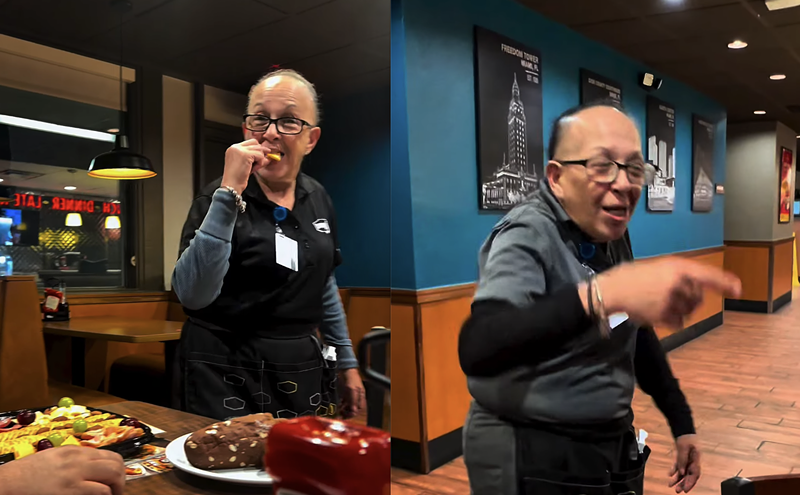Bees are such tiny, seemingly inconsequential creatures, yet milligram for milligram, they affect the landscape in profound ways. You could say the same about small, delicate movies like Italian filmmaker Alice Rohrwacher's 2014 Cannes Grand Prix winner The Wonders, which tells the story of a hippie beekeeper family in the remote Tuscan countryside. This crew of six — mother, father, and four young girls — lives in a crumbling old house lacking certain essentials, like a door separating the kids' bedroom from the bathroom. Their honey-processing machinery, largely minded by the family's eldest daughter, adolescent Gelsomina (Maria Alexandra Lungu), is reasonably efficient but definitely old-school. When the family gets a chance to participate in a reality-TV competition showcasing the products of local farmers, Gelsomina — partly dazzled by the show's beguiling host, played by Monica Bellucci in a glorious, white, fan-shaped headdress and partly just yearning for some taste of the outside world — begs her father, a taciturn loner, to consent. What happens is less significant than how it happens: The Wonders has an intimate,
Though she's barely a teenager, Gelsomina is in many ways the backbone of both the family and the business. She's the one on whom her father, Wolfgang (Sam Louwyck), most
We see the wider world opening up to her.
tweet this
Gelsomina's circumscribed world is changed by two things: the arrival of a troubled German boy, Luis Huilca's Martin, whom her father has taken on as a farmhand, and a minor accident that seems disastrous at first but later has happy consequences. Alice Rohrwacher, who also wrote the script, knows this land and its people — the film is set in her hometown, between Umbria-Lazio and Tuscany — though she has noted that it isn't autobiographical. Rohrwacher calls it a fable, but it may be more a beautifully smudgy sketch of both a way of living and a way of growing up.
Gelsomina's family argues in Italian, but the language of hippie parents is universal, speaking of a kind of back-to-Eden innocence at its best and a willful resistance to modernity at worst. In The Wonders, we see a little of both: In nice weather, the family sleeps piled up together on an outdoor mattress, as if not wanting to waste a minute of the shared time they get to spend in this glorious countryside, a million shades of brown and green. But Wolfgang's mulish insistence on doing things the old way — he sees his refusal to bring his honey-making facilities up to code as a kind of activist martyrdom — could endanger his livelihood and his family. He's both a mildly sympathetic character and a maddening one, an example of the way people who stalwartly resist change are more often cowardly than brave.
It's Gelsomina, of course, we feel the most for. Lungu's performance is so hushed and unfussy that you may not realize how moving it is until after the picture's over. Her relationship with shy, anxious Martin, who doesn't speak but who has an uncanny talent for wild whistling, isn't the sexual coming-of-age transformation you might expect; instead, she offers him the kind of tenderness that both goes beyond sex and is, when it's great, part of its essence. At one point, a family friend visits and suggests somewhat teasingly that it may be time for Wolfgang and company to give up on the old ways and move to Milan. Wolfgang snorts, and Angelica demurs that the city isn't for her. But Gelsomina says Yes! to Milan not just with words but with her face — it lights up with a glow that's half Tuscan sunset, half city-café candlelight. And when she first gazes at the vision in white that is Bellucci's TV-show goddess — a wink straight out of Fellini, decked out in a platinum, pearl-strewn mermaid's wig and a gown that magically skims the surface of the stone amphitheater where the farmers' competition is set to take place — we see the wider world opening up to her. That's not to say Gelsomina's future will be one of gowns or wigs or fake pearls. It won't be a glamorous dream but something sturdier and better. Her kindness will light the way, and the spirit of her family — both human and bee — will be with her always.
The Wonders
Starring Maria Alexandra Lungu, Sam Louwyck, Monica Bellucci, Alba Rohrwacher, and Sabine Timoteo. Written and directed by Alice Rohrwacher. 110 minutes. Not rated. Opens Friday, November 27, at Miami Beach Cinematheque.








